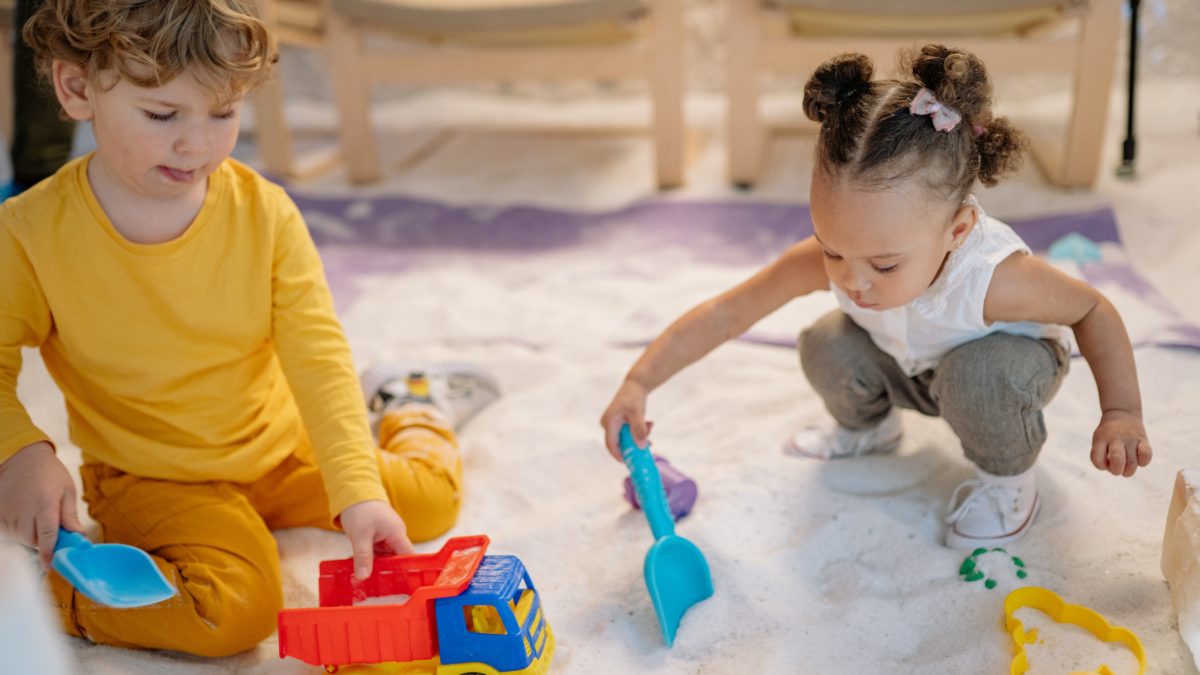One Place First 2,000 Days Series: Unpacking Early Learning and Neurological Development

For years, researchers have believed that the first 2,000 days—or five years—of a child’s life have a long-lasting impact on the trajectory of their life.
Today, scientific brain research finds that environmental stress and adverse childhood experiences (ACEs)—even among infants and toddlers—can interfere with the healthy development of neural connections inside the brain which are absolutely crucial for a child’s social-emotional development.
At One Place we understand the importance of the first 2,000 days and work to ensure a healthier start for children in Onslow County and beyond through all our programs and services.
Understanding Infant and Early Childhood Mental Health
Infant and Early Childhood Mental Health, often referred to as I-ECMH, spotlights the first five years of a child’s life. This period of time is crucial as a child’s brain grows faster during these years than any other time in their lives—and this growth paves the path for all important areas of development, including physical, cognitive, social, emotional, and sensory and motor skills.
Because the brain is very impressionable to both positive and negative stimuli and interactions during the first five years, negative experiences during this time can have long-term—and deeply consequential—impacts.
What is Infant and Early Childhood Mental Health?
A child’s mental health serves as the foundation of healthy development. I-ECMH is defined by researchers as the capacity of a child, from birth to age five, to:
- Experience, express, and regulate emotions
- Form close, secure interpersonal relationships
- Explore his/her environment and learn, within the context of family and cultural expectations
Why does Infant and Early Childhood Mental Health Matter?
The mental health of a child is directly linked to their neurological development. This includes a child’s brain’s architecture and the neural pathways created through routine experiences and interpersonal relationships.
Without positive early childhood experiences, I-ECMH disorders can impact a child’s development substantially—and these effects can manifest over their entire life. Approximately 9.5–14.2 percent of children from birth to five years old experience emotional, relational, or behavioral disturbances.
Many of these emotional and behavioral challenges are linked to Adverse Childhood Experiences (ACEs), which include a wide range of scenarios, including parental loss, mental illness, exposure to environmental or interpersonal trauma, and substance abuse. In North Carolina, 23.3 percent of children have one ACE and 23.6 percent have experienced two or more.
Long-Term Impacts of Poor Childhood Mental Health
The long-term impacts of poor childhood mental health are substantial, sometimes affecting a child throughout their entire lives.
Physical and Emotional Health
Children with more than two ACEs are more likely to qualify as children with special health care needs—and researchers are documenting a direct correlation between the number of ACEs that a child has dealt with and their future likelihood of developing cancer, chronic bronchitis, heart disease, hepatitis, and skeletal fractures.
When a child experiences more than four ACEs in their first 2,000 days, it has long-term consequence on their overall mental and emotional well-being. One study discovered a significantly increased risk of depression, suicide attempts, and alcohol and drug use in adults who had experienced ACEs as a child.
School Success
The ability to thrive academically is also linked to healthy social and emotional development. Many children who undergo ACEs may experience ongoing and severe mental health challenges. As a result, they may struggle in school. Students who have experienced ACEs are more likely to experience absenteeism, are more than twice as likely to repeat a grade in school, and are substantially less likely to graduate from high school.
Working Toward a Stronger Future for Children’s Mental Health
At One Place, we are dedicated to providing resources for children and families to strengthen familial relationships, develop social-emotional skills, and ultimately reduce sources of stress by providing the support systems they need.
Early Prevention Strategies
At One Place, all of our programs are designed to provide children with positive relationships and nurturing experiences—by educating parents and caregivers on the importance of social-emotional development and offering high-quality early childhood education opportunities.
Learn more about our Preschool Programs
Learn more about our Infant/Toddler Programs
Learn more about high-quality child care options in Onslow County
When children in our community are hurt by abuse or through other adverse childhood experiences, they may need professional help to cope with their trauma. Our Child Advocacy Center is a child-focused facility that brings together law enforcement, child protective services, prosecution, and medical and mental health professionals to develop a coordinated strategy to help a child in need.
Learn more about our Child Advocacy Center here.
Policy Intervention Strategies
In addition to the tactical preventative and intervention programs offered by One Place and other nonprofit organizations, policy changes may also result in new possibilities for children.
Zero to Three recommends that state policymakers implement evidence-based strategies to improve mental health outcomes—both for children and for their families. Learn more about what states can do to advance infant and early childhood mental health results.
To learn more about One Place’s work preventing and reducing the impact of ACEs and toxic stress, click here.
